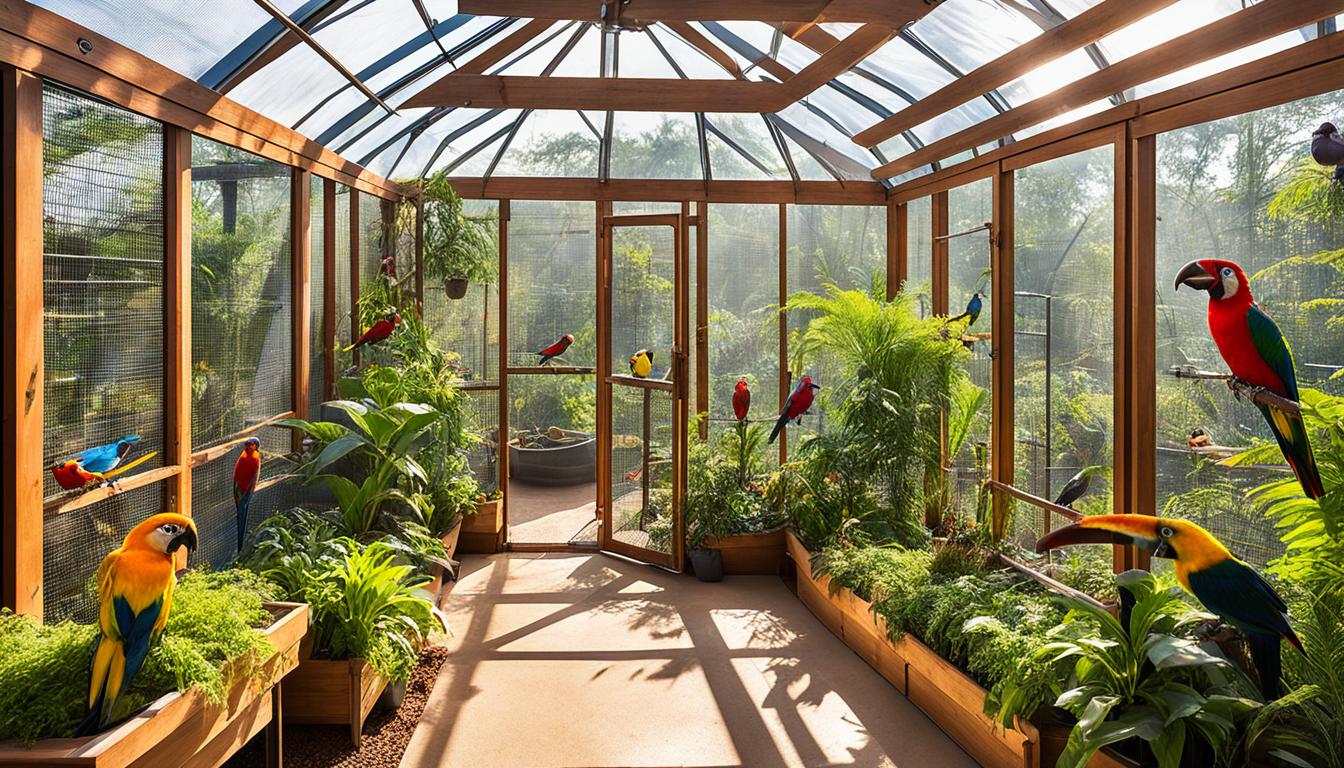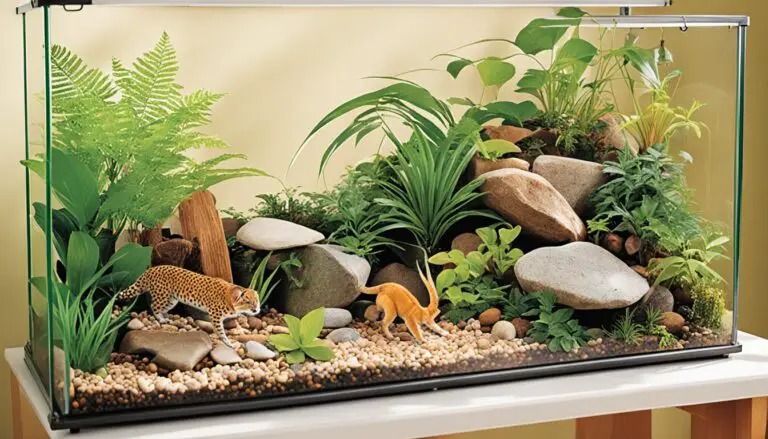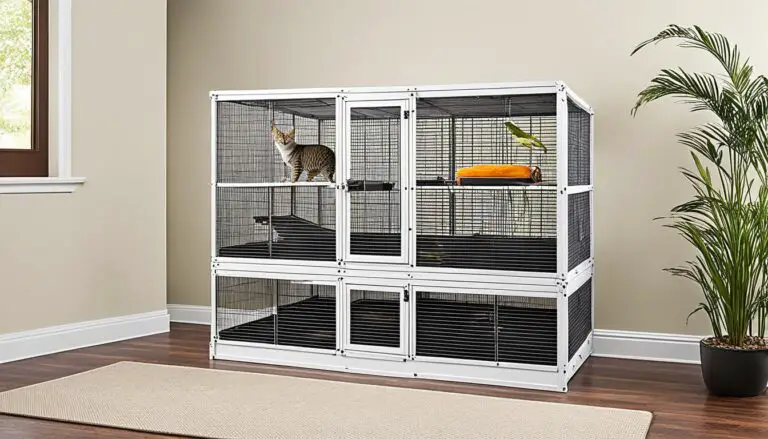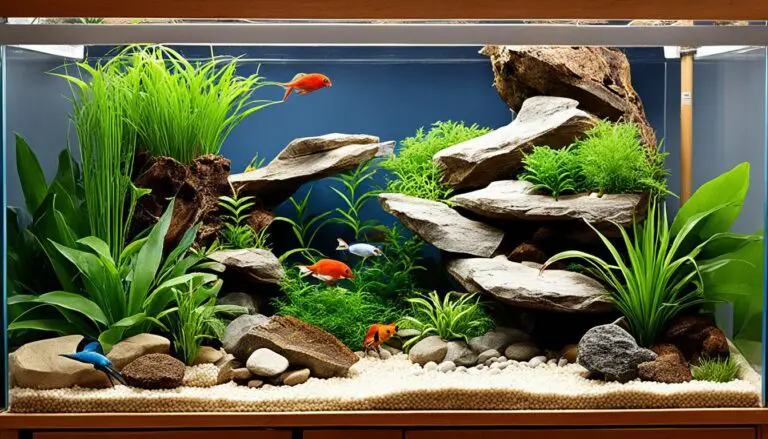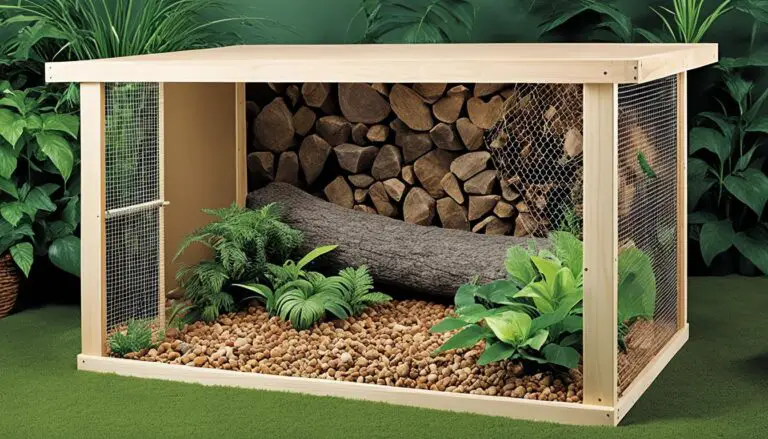Exotic Pet Housing for Birds: Quick Guide & Tips
Exotic pet owners often wonder how to create the perfect living space for their feathered companions. From bird cages to aviaries and enclosures, finding the right housing for exotic birds is crucial for their well-being and happiness.
Key Takeaways:
- Understanding the specific needs of exotic birds is essential for their care and well-being.
- Creating a proper living environment involves considering cage size, setup, temperature, lighting, and cleanliness.
- Providing a nutritious diet with a variety of fresh fruits and vegetables, pellets, and limited treats is important.
- Social interaction and mental stimulation through training, playtime, and socialization are crucial for exotic birds.
- Regular veterinary care, including check-ups, quarantine for new birds, nail and beak maintenance, and preventative measures, is vital for their health.
Understanding the Needs of Exotic Birds
When it comes to caring for exotic birds, it’s important to remember that each species has its own unique needs and requirements. From dietary preferences to social interaction, environmental enrichment to veterinary care, understanding these aspects is vital for ensuring the well-being of your feathered companion.
Exotic bird species encompass a wide range of creatures, each with its own specific dietary requirements. Some species enjoy a diverse diet of fresh fruits and vegetables, while others may require pellets and seeds formulated to meet their nutritional needs. Consulting with avian experts or conducting thorough research can provide valuable insights into the dietary needs of your particular bird species.
Aside from dietary requirements, social interaction plays a significant role in the life of an exotic bird. These intelligent and sociable creatures thrive on companionship and mental stimulation. Investing time in daily interaction, training sessions, and providing engaging toys and activities can help satisfy their social and intellectual needs.
Creating an enriched environment is another crucial aspect of exotic bird care. Environmental enrichment involves offering a variety of toys, perches, and activities that encourage natural behaviors and mental stimulation. This can include objects for climbing, foraging, and playing, as well as opportunities for flight and exploration within a safe indoor or outdoor area.
Veterinary care is a critical component of ensuring the overall health and well-being of your exotic bird. Regular check-ups, vaccinations, and preventative care measures are essential to detect and prevent potential health issues. Your avian veterinarian can provide guidance on specific healthcare requirements for your bird species.
“Understanding the unique needs of exotic birds, from their dietary requirements to the importance of social interaction and environmental enrichment, is key to providing optimal care.” – Dr. Emily Parker, Avian Specialist
By comprehending the specific needs of exotic bird species, you can create an environment that promotes their physical and mental well-being. From providing a suitable diet to fulfilling their social and environmental needs, it’s essential to prioritize their health and happiness.

Strongly considering the individual needs of your bird species is crucial to its overall health and happiness.
Creating the Ideal Living Environment
Providing a conducive living space for exotic birds involves careful consideration of several key factors. These include cage size, cage setup, temperature regulation, lighting conditions, and cleanliness. Ensuring that these elements are properly addressed is crucial for the overall health and well-being of your feathered companions.
Choosing the Right Cage Size
When it comes to cage size, bigger is always better. Exotic birds need spacious cages that allow them to move around freely, stretch their wings, and engage in natural behaviors. A cage that is too small can restrict their movement and lead to boredom, stress, or even physical health problems. Consider the size and flight capabilities of your bird species when selecting the appropriate cage dimensions.
Optimizing Cage Setup
The way you set up your bird’s cage can greatly impact their comfort and well-being. Ensure that the cage has multiple perches of varying heights, thicknesses, and textures. This provides mental stimulation and helps keep their feet in good condition. Include a variety of toys, such as puzzles, swings, and chewable objects, to keep them entertained and mentally stimulated.
Regulating Temperature and Lighting
Exotic birds have specific temperature and lighting requirements to thrive. Maintain a temperature that is suitable for your bird’s species, avoiding extreme heat or cold. Providing a source of UVB lighting is essential for their overall health and ensures they receive the necessary vitamin D3 synthesis. Position the cage away from direct sunlight or drafts that can cause temperature fluctuations or discomfort.
Maintaining Cleanliness
A clean environment is essential to prevent the spread of diseases and maintain the well-being of your exotic birds. Regularly clean and sanitize the cage, perches, toys, and food/water dishes. Remove any uneaten food promptly to prevent contamination. Use bird-safe cleaning products and avoid using strong chemicals or fumes that can be harmful to your bird’s respiratory system.

Summary of Ideal Living Environment:
| Aspect | Key Considerations |
|---|---|
| Cage Size | Ensure ample space for free movement and wing stretching. |
| Cage Setup | Provide perches of varying thicknesses and textures, along with stimulating toys. |
| Temperature | Maintain suitable temperatures based on species requirements. |
| Lighting | Offer UVB lighting for vitamin D3 synthesis, avoiding direct sunlight or drafts. |
| Cleanliness | Regularly clean and sanitize the cage, perches, toys, and feeding/watering accessories. |
By creating an ideal living environment that considers cage size, setup, temperature, lighting, and cleanliness, you can ensure the well-being and happiness of your exotic birds.
Providing a Nutritious Diet
A balanced and nutritious diet is essential for the health of exotic birds. By providing them with the right combination of fresh fruits and vegetables, high-quality pellets, and seeds in moderation, you can ensure their well-being and longevity.
Exotic birds thrive on a diet that mimics what they would eat in their natural habitats. Here are some key components to consider:
- Fresh Fruits and Vegetables: Include a variety of fresh fruits and vegetables in your bird’s diet. These foods provide essential vitamins, minerals, and antioxidants. Popular options include apples, bananas, grapes, carrots, and leafy greens like spinach or kale.
- Pellets and Seeds: High-quality pellets formulated specifically for your bird’s species are a crucial part of their diet. These pellets offer a balance of nutrients and can serve as the main source of nutrition. Additionally, include a moderate amount of seeds to provide variety and natural foraging stimulation.
- Limited Treats: While treats can be a great way to bond with your bird and offer occasional rewards, they should be given sparingly. Treats like nuts or dried fruits can be high in fat and sugar, which may contribute to health issues if consumed excessively. Always prioritize the main components of their diet.
It’s important to note that each bird species may have specific dietary requirements. Consult with an avian veterinarian or an expert in exotic bird care to determine the ideal diet for your feathered friend.
Inspire a balanced diet for your exotic bird with a visually appealing image:

Social Interaction and Mental Stimulation
Exotic birds thrive on social interaction and mental stimulation, as these intelligent creatures require companionship and engagement to lead fulfilling lives. Incorporating regular training sessions, playtime, and socialization opportunities is essential for their overall well-being.
Training Sessions
Training sessions provide an excellent opportunity to bond with your exotic bird while teaching them new skills and behaviors. Whether it’s teaching them tricks, basic commands, or even simple problem-solving tasks, these sessions stimulate their cognitive abilities and create a stronger bond between you and your feathered friend.

Playtime
Playtime is not only enjoyable for exotic birds but also crucial for their mental and physical health. Providing a variety of toys that encourage exploration, problem-solving, and physical activity can keep them entertained and mentally stimulated. Rotate the toys regularly to maintain their interest and introduce new challenges.
Engaging in interactive games with your bird, such as hide-and-seek or puzzle-solving, can also provide mental stimulation and strengthen your bond. These activities simulate natural behaviors and help satisfy their curious nature, leading to contentment and happiness.
Socialization
Socialization plays a vital role in meeting the social needs of exotic birds. Supervised interaction with other birds of the same species or compatible household members allows them to express their innate behaviors and communicate in a natural way. This socialization helps prevent feelings of loneliness and boredom, promoting a healthier and happier bird.
Remember to closely monitor the interactions to ensure the safety and well-being of all birds involved. If introducing unfamiliar birds, gradually introduce them in neutral territory and observe their behavior throughout the process.
Quote:
“By providing training sessions, playtime, and socialization opportunities, you are not only fulfilling the social and mental needs of your exotic bird but also strengthening the bond between you and your feathered companion.” – Dr. Jane Peterson, Avian Behaviorist
| Benefits of Social Interaction and Mental Stimulation | How to Incorporate |
|---|---|
| 1. Improves cognitive abilities and problem-solving skills | 1. Set aside regular training sessions for teaching new skills |
| 2. Prevents boredom and reduces the risk of behavioral problems | 2. Provide a variety of toys and games for playtime |
| 3. Reduces stress and anxiety | 3. Allow supervised socialization with compatible birds or household members |
| 4. Strengthens the bond between you and your bird | 4. Engage in interactive games and activities together |
By prioritizing social interaction and mental stimulation through training sessions, playtime, and socialization, you can provide a well-rounded and fulfilling life for your exotic bird.
Veterinary Care and Health Maintenance
Regular check-ups, quarantine for new birds, nail and beak maintenance, vaccinations, and preventative care are essential for the overall health and well-being of exotic birds. By prioritizing their healthcare needs, you can ensure that your feathered companion enjoys a long and happy life.
Regular Check-ups: Just like humans, birds require regular check-ups to detect any underlying health issues or potential risks early on. Expert avian veterinarians are equipped to perform thorough physical examinations, including blood tests and other diagnostic procedures, to ensure your bird’s overall well-being.
Quarantine for New Birds: When introducing a new bird into your flock, it’s crucial to quarantine them to minimize the risk of spreading diseases. Quarantine periods can vary but usually range from 30 to 90 days, during which the bird should be kept in a separate, well-ventilated area away from other birds.
Nail and Beak Maintenance: Regular nail and beak maintenance is necessary to prevent overgrowth and discomfort for your bird. Trimming the nails and beak should be done carefully using specially designed avian nail clippers and a gentle touch. If you’re uncertain about how to perform this maintenance, consult with an avian veterinarian or an experienced bird groomer.
Vaccinations and Preventative Care: Vaccinations play a crucial role in protecting exotic birds from common avian illnesses, such as avian influenza and psittacosis. Your avian veterinarian will recommend the appropriate vaccinations based on your bird’s species and potential exposure risks. In addition to vaccinations, preventative care measures, such as regular deworming and parasite control, should be implemented to safeguard your bird’s health.
By prioritizing regular check-ups, implementing quarantine protocols for new birds, maintaining nail and beak health, and following a vaccination and preventative care schedule recommended by your veterinarian, you are taking proactive steps to ensure the health and well-being of your exotic bird.
Conclusion
Caring for exotic birds requires commitment, knowledge, and a genuine passion for these remarkable creatures. By understanding their unique needs and providing a nurturing environment with proper housing, a nutritious diet, social interaction, and regular veterinary care, you can ensure that your exotic bird lives a happy and healthy life as a valued member of your family.
Exotic bird care encompasses various aspects, and each contributes to the overall well-being and quality of life for these captivating creatures. Proper housing is essential to provide them with a safe and comfortable living space. A spacious cage or aviary with appropriate perches and environmental enrichment creates a stimulating and fulfilling habitat.
A nutritious diet lays the foundation for a healthy bird. By offering a balanced combination of fresh fruits and vegetables, pellets or seeds, and limited treats, you can ensure that your exotic bird receives essential nutrients to thrive.
Social interaction and mental stimulation are integral to the happiness and emotional well-being of exotic birds. Through training sessions, playtime, and supervised socialization, you can provide the companionship and mental enrichment that these intelligent creatures crave.
Regular veterinary care is crucial for monitoring the health of your exotic bird. From routine check-ups to preventative measures and specialized care, a knowledgeable avian veterinarian will help safeguard the well-being of your feathered friend.
“By understanding their unique needs and providing a nurturing environment with proper housing, a nutritious diet, social interaction, and regular veterinary care, you can ensure that your exotic bird lives a happy and healthy life as a valued member of your family.”
Caring for exotic birds is a rewarding responsibility that requires dedication and ongoing education. By implementing the essential components of exotic bird care, you can create a loving and enriching environment that promotes their physical and emotional well-being.
Summary Checklist for Exotic Bird Care:
| Aspect | Summary |
|---|---|
| Proper Housing | Provide a spacious and enriching living space, such as a cage or aviary. |
| Nutritious Diet | Offer a balanced combination of fresh fruits and vegetables, pellets or seeds, and limited treats. |
| Social Interaction | Engage in training sessions, playtime, and supervised socialization for mental stimulation and companionship. |
| Veterinary Care | Ensure regular check-ups, preventative measures, and specialized care by an avian veterinarian. |
By following these guidelines and providing holistic care, you can enjoy a fulfilling and harmonious relationship with your beloved exotic bird companion.
Resources for Shelter Care of Exotic Birds
The Avian Welfare Coalition offers a range of valuable resources aimed at assisting shelters in providing specialized care and proper placement for exotic birds. These resources are designed to equip shelters with the necessary knowledge and tools to ensure the well-being of these unique and magnificent feathered creatures.
Avian Wellness Series
The Avian Wellness Series, offered by the Avian Welfare Coalition, consists of informative webinars that cover various aspects of avian health and well-being. These webinars provide shelter staff and volunteers with valuable insights and best practices for the care and enrichment of exotic birds in a shelter setting.
“How To” Guides for Bird Shelters
The Avian Welfare Coalition provides comprehensive and user-friendly “how to” guides specifically tailored to the needs of bird shelters and care facilities. These guides cover a wide range of topics, including housing requirements, proper nutrition, socialization, and enrichment activities for exotic birds. They serve as invaluable resources for shelters aspiring to provide top-notch care for their avian residents.
Captive Exotic Bird Care Handbook
The captive exotic bird care handbook, authored by avian experts in collaboration with the Avian Welfare Coalition, serves as a comprehensive guide for the proper care and management of exotic birds in a captive setting. This handbook covers essential topics such as housing, diet, veterinary care, behavior, and enrichment, providing shelters with a go-to resource for ensuring the welfare of their feathered inhabitants.
Avian Care Workshop
The Avian Welfare Coalition organizes avian care workshops tailored to the specific needs of shelter staff and volunteers. These workshops feature interactive sessions led by avian experts, covering a wide range of topics including bird handling techniques, nutrition, behavior management, and health assessment. Participating shelters benefit from the knowledge and expertise shared during these workshops, enabling them to enhance the level of care they provide to exotic birds.
Bird Rescue Organizations
For shelters seeking placement partners or additional support, the Avian Welfare Coalition provides a directory of reputable bird rescue organizations. These organizations specialize in the rescue, rehabilitation, and rehoming of exotic birds in need, ensuring their well-being and facilitating their transition to loving forever homes.
Comparison of Avian Welfare Resources
| Resource | Description |
|---|---|
| Avian Wellness Series | Informative webinars covering various aspects of avian health and well-being |
| “How To” Guides for Bird Shelters | Comprehensive guides tailored to the specific needs of bird shelters and care facilities |
| Captive Exotic Bird Care Handbook | A comprehensive guide for the proper care and management of exotic birds in a captive setting |
| Avian Care Workshop | Interactive workshops led by avian experts, covering various topics related to avian care |
| Bird Rescue Organizations | A directory of reputable bird rescue organizations for shelter partnerships and support |
Conclusion
Caring for exotic birds is a fulfilling journey that requires dedication, knowledge, and a deep passion for their well-being. By understanding their unique needs and providing them with a nurturing environment, proper exotic pet housing, a balanced diet, regular social interaction, and reliable veterinary care, you can ensure that your feathered companion lives a happy, healthy, and fulfilling life.
Creating the perfect exotic bird habitat is crucial. Whether it’s a bird cage or an aviary, the living space should be spacious enough to allow free movement and include perches and toys for mental stimulation. Ensuring a clean and comfortable environment, with appropriate temperatures and lighting, is essential for the bird’s well-being.
Additionally, providing a nutritious diet that includes fresh fruits and vegetables, high-quality pellets, and limited treats helps maintain their optimal health. Regular social interaction and mental stimulation through training sessions, playtime, and supervised socialization are also vital for their overall happiness.
Lastly, regular veterinary check-ups, quarantine procedures for new birds, and proper maintenance of their nails and beaks are necessary to prevent illnesses and maintain their health. By following these guidelines and forming a strong bond through care and affectionate interaction, you can create a rewarding and joyous experience for both you and your exotic bird.
FAQ
What are some important factors to consider when choosing a bird cage or aviary?
What should I include in my exotic bird’s diet?
How can I provide social interaction and mental stimulation for my exotic bird?
How often should I take my exotic bird to the vet?
What resources are available for shelters caring for exotic birds?
How can I ensure the overall well-being of my exotic bird?
Source Links
- https://www.pandemoniumrainforestproject.org/blog-1/3dn07a1yhlhnnkue6h8pii8wvii2du
- https://www.tampavet.com/exotics-blog/husbandry/
- https://www.avianwelfare.org/shelter_outreach.htm
Peter Stones is the founder of Exotic Pets Place, the leading online resource for exotic pet care information.
With over 10 years of hands-on exotic pet ownership experience, he is deeply passionate about sharing his expertise to help others properly care for their unusual pets.
When he's not writing extensively researched articles or connecting with fellow exotic pet enthusiasts worldwide, you can find Peter at home tending to his own beloved menagerie of exotic animals.

